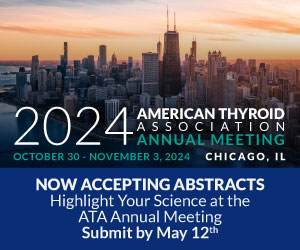ATA asks the FDA to ensure safe and effective levothyroxine preparations
 |
 |
 |
April 4, 2003
Mark McClellan, M.D., Ph.D.
Commissioner
U.S. Food and Drug Administration
5600 Fishers Lane
Rockville, MD 20857
Dear Dr. McClellan:
The undersigned, representing the more than 10,000 members of our respective societies, are writing to express our concern with the current FDA Guidance for assessing bioequivalence of levothyroxine (T4) products. Several of our members, representing the American Thyroid Association (ATA), the American Association of Clinical Endocrinologists (AACE), the Endocrine Society (TES), and the Lawson Wilkins Pediatric Endocrine Society, presented their views on March 13, 2003 at the FDA before the Advisory Committee for Pharmaceutical Science. In brief, we are concerned about the failure of the FDA Guidance to assess T4 bioequivalence by taking into account 1) a baseline correction for endogenous thyroxine, and 2) the consequences in normal subjects of suppressing the serum thyrotropin (TSH) level and endogenous thyroxine production. Other experts representing clinicians and patient advocacy groups testified similarly.
As you know, the current method for determining bioequivalence is based on measurement of serum thyroxine concentrations over time after administration of a single supraphysiological dose in normal subjects. We now appreciate that this method is quite inaccurate for a narrow therapeutic index compound. Due to the substantial endogenous thyroxine production and circulating concentration, different preparations could have very substantial differences in thyroxine potency and/or bioavailability and still meet criteria for bioequivalence in this assay.
Thyroxine is well documented to have a narrow toxic-to-therapeutic ratio. Small differences between doses—well within the range of formulation differences that might be undetected with the current bioequivalence method–can have major clinical implications for thyroid patients, including symptoms, atrial fibrillation, osteoporosis, and uncontrolled hypercholesterolemia. As a result, we are extremely concerned that the current method used to determine levothyroxine bioequivalence and resulting wide tolerances for acceptability put patients at risk of adverse events.
The current standard also increases the cost and complexity of medical care because patients must undergo repeat laboratory testing, and often make additional physician office visits to retitrate the thyroxine dose when a new potentially nonequivalent formulation is prescribed for a given patient. In an era when rising healthcare costs will lead many patients, physicians, and payers to switch formulations from time to time, it is particularly vital for patients to be prescribed only levothyroxine products for which tested bioequivalence accurately reflects therapeutic equivalence.
In the interest of ensuring safe and effective levothyroxine preparations, we ask that you convene a panel of experts, including expert clinical endocrinologists, to consider this issue further, and to develop a revised guidance as may be warranted. This panel might recommend more definitive guidelines to determine the optimal pharmacokinetic study model with or without corrections. To fail to examine this issue and permit continued use of the current faulty bioequivalence standard constitutes, in our view, a great disservice to patients and physicians. We would be pleased to nominate expert members of our organizations to serve on such a committee, joining pharmaceutical and pharmacokinetic experts of your choosing.
Dr. Paul Ladenson M.D, Secretary of the ATA, has been designated as the point of contact for this request by our respective societies. Dr. Ladenson can be reached at 410-955-3663. We look forward to your positive response to this request.
Sincerely,

Peter A. Singer, M.D.
President, American Thyroid Association

John D. Baxter, M.D.
President, Endocrine Society

Hossein Gharib, M.D.
President, American Association of Clinical Endocrinologists
xc: Janet Woodcock, M.D.
David G. Orloff, M.D.
Paul W. Ladenson, M.D.
# # #
See related articles on Bioequivalence of Levothyroxine



